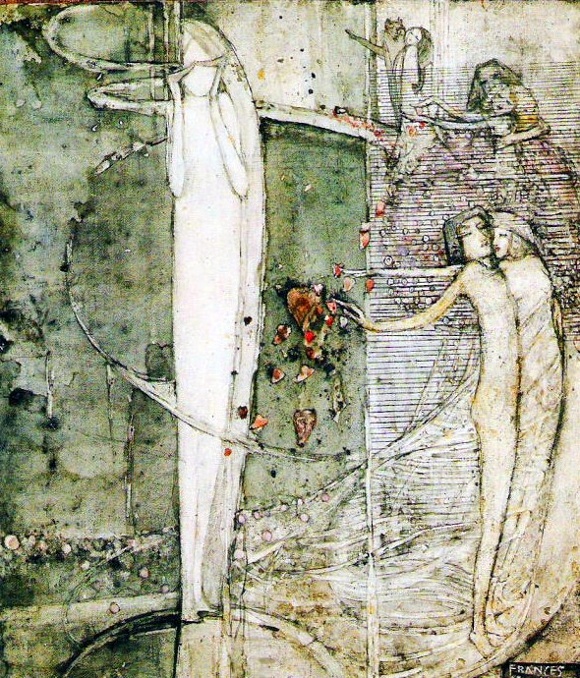John Keats, selected poems Contents
- Social and political context
- Religious and philosophical context
- Literary context
- Bright Star! Would I were steadfast as thou
- The Eve of St Agnes
- ‘Hush, hush! tread softly! hush, hush, my dear!’
- Isabella: or The Pot of Basil
- La Belle Dame Sans Merci
- Lamia
- Lines to Fanny (‘What can I do to drive away’)
- O Solitude, if I must with thee dwell
- Ode on a Grecian Urn
- Ode on Indolence
- Ode to a Nightingale
- Ode to Autumn
- Ode to Melancholy
- Ode to Psyche
- On First Looking Into Chapman’s Homer
- On Seeing the Elgin Marbles
- On the Sea
- Sleep and Poetry
- Time’s sea hath been five years at its slow ebb
- To Ailsa Rock
- To Leigh Hunt
- To Mrs Reynolds’s Cat
- To My Brothers
- To Sleep
- When I have fears that I may cease to be
To Sleep: Synopsis and Commentary
Synopsis of To Sleep
The poem’s speaker apostrophises a personified Sleep, describing it as the soft and benign provider of ‘forgetfulness’ for the troubled human spirit. The speaker calls on Sleep to end his wakefulness, otherwise he will be disturbed by thoughts of the day that has passed and his own examination of his conscience, which throw up unhelpful memories like a molehill. Instead, the speaker asks Sleep to lock up the ‘casket of my soul’.
 Commentary on To Sleep
Commentary on To Sleep
In a letter (dated May 1819) to his brother George and his wife, Keats commented:
I have been endeavouring to discover a better sonnet stanza than we have. The legitimate [Petrarchan sonnet] does not suit the language over-well from the pouncing rhymes – the other kind [the Shakespearean] appears too elegiac – and the couplet at the end of it seldom has a pleasing effect – I do not pretend to have succeeded – it will explain itself…
We can see Keats experimenting with form in this sonnet.
Glossary
embalmer: To embalm means to preserve a corpse from decay, originally with spices and subsequently by injecting a preservative into the corpse’s arteries. Here the word means more generally someone who prepares a body for a funeral (including shutting its eyes).
embowered: surrounded or sheltered, especially with trees or climbing plants
soothest: Invented by Keats, this term means ‘most soothing’ but its sound also helps to convey a sense of ‘smoothness’.
poppy: The medically trained Keats would be familiar with opiates produced by the opium poppy which were used to reduce pain or induce sleep.
wards: the ridges or bars in a lock
casket: a small ornamental box or chest for holding jewels or other valued objects.
Investigating commentary on To Sleep
- What particular benefits does the speaker attribute to Sleep?
- What does this suggest about the speaker’s state of mind?
1. A turning aside to address someone directly in a poem.
2. The sign ( ' ) used to indicate the omission of one or more letters or to denote possession in a noun.
Represented or imagined as a person.
A sonnet is a poem with a special structure. It has fourteen lines, which are organised in a particular manner, usually characterised by the pattern of rhyming, which changes as the ideas in the poem evolve.